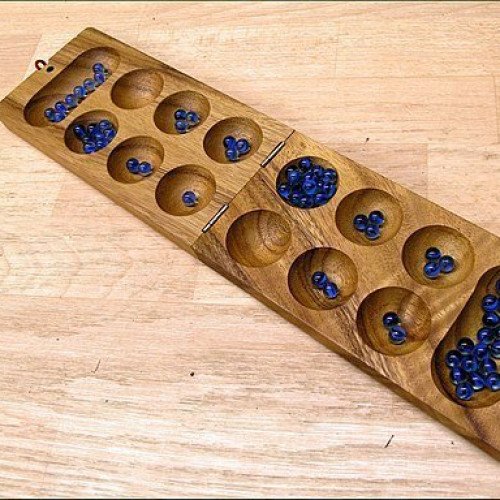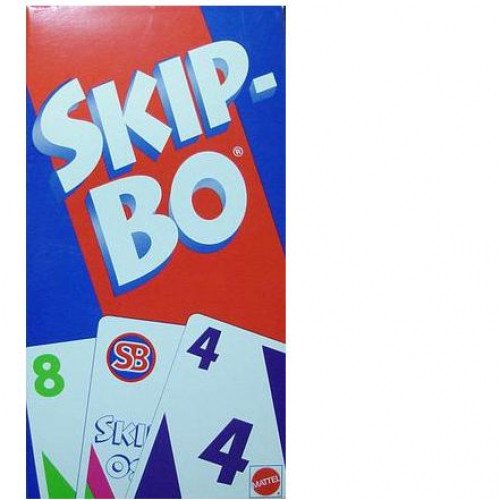KALAH VS SKIP-BO

KALAH
Kalah, also called Kalaha or Mancala, is a game in the mancala family invented in the United States by William Julius Champion, Jr. in 1940. This game is sometimes also called "Kalahari", possibly by false etymology from the Kalahari desert in Namibia. As the most popular and commercially available variant of mancala in the West, Kalah is also sometimes referred to as Warri or Awari, although those names more properly refer to the game Oware. For most of its variations, Kalah is a solved game with a first-player win if both players play perfect games. The Pie rule can be used to balance the first-player's advantage. Mark Rawlings has written a computer program to extensively analyze both the "standard" version of Kalah and the "empty capture" version, which is the primary variant. The analysis was made possible by the creation of the largest endgame databases ever made for Kalah. They include the perfect play result of all 38,902,940,896 positions with 34 or fewer seeds. In 2015, for the first time ever, each of the initial moves for the standard version of Kalah(6,4) and Kalah(6,5) have been quantified: Kalah(6,4) is a proven win by 8 for the first player and Kalah(6,5) is a proven win by 10 for the first player. In addition, Kalah(6,6) with the standard rules has been proven to be at least a win by 4. Further analysis of Kalah(6,6) with the standard rules is ongoing. For the "empty capture" version, Geoffrey Irving and Jeroen Donkers (2000) proved that Kalah(6,4) is a win by 10 for the first player with perfect play, and Kalah(6,5) is a win by 12 for the first player with perfect play. Anders Carstensen (2011) proved that Kalah(6,6) was a win for the first player. Mark Rawlings (2015) has extended these "empty capture" results by fully quantifying the initial moves for Kalah(6,4), Kalah(6,5), and Kalah(6,6). With searches totaling 106 days and over 55 trillion nodes, he has proven that Kalah(6,6) is a win by 2 for the first player with perfect play. This was a surprising result, given that the "4-seed" and "5-seed" variations are wins by 10 and 12, respectively. Kalah(6,6) is extremely deep and complex when compared to the 4-seed and 5-seed variations, which can now be solved in a fraction of a second and less than a minute, respectively.
Statistics for this Xoptio

SKIP-BO
Skip-Bo is a commercial version of the card game Spite and Malice, a derivative of Russian Bank (also known as Crapette or Tunj). In 1967, Minnie Hazel "Skip" Bowman (1915–2001) of Brownfield, Texas, began producing a boxed edition of the game under the name SKIP-BO. In 1980 the game was purchased by International Games, which was subsequently bought by Mattel in 1992. A mobile version of the game for iOS was released by Magmic in September, 2013. There is a new version called "SKIP-BO Mod" that comes in a white and blue case. Two to four people can play at a time as individuals, or, six or more players in teams (no more than three partnerships). The object of the game is to be the first player or team to play out their entire stock pile(s). The player with the middle age goes first. Each player is dealt 30 cards (recommended 10-15 for faster gameplay) for their pile with only the top card visible, and a hand of five cards, and the remaining cards are placed face down to create a common draw pile. The shared play area allows up to four build piles, which must be started using either a "1" card or a Skip-Bo, and each player also has up to four personal discard piles. Each turn the active player draws until they have five cards in hand, though there are cases of not drawing more cards to equal five cards, instead doing a draw of a certain number of cards. They must play either the next card in sequential order or a wild Skip-Bo card, using either cards in hand, the top card of their stock pile, or the top card of any of their four discard piles. If the player can play all five cards from their hand, they draw five more and continue playing. When no more plays are available, the player discards one card to either an empty discard pile or on top of an existing one and play passes to the next player. When a build pile reaches 12, it is removed from the board and that space becomes empty for another pile to be started; play continues until one player has played their final start card.